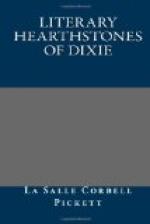At the close of the two years spent in San Antonio, the family returned to Columbus and later found a home in Mobile, Alabama, the town of the “Maubila,” Choctaw, Indians. It is a pleasant town of shaded streets, romantic drives and beautiful homes. Its history reaches back through the centuries to a time long before the United States had being, and it is the only American city that has seen five flags wave over it: French, English, Spanish, United States and Confederate.
While in this home Augusta Evans became widely known through the publication in 1859 of her second novel, “Beulah.” Then came the war, bringing forth her one war-novel, “Macaria.” “Vashti,” “St. Elmo,” “Infelice,” “At the Mercy of Tiberius,” the latter being her best, followed in quick succession, until her marriage put a close to her work, for Mr. Wilson was unwilling that she should tax her strength by close application. Life in the delightful home furnished interest enough to make resort to fiction unnecessary as an entertainment. In 1879 the death of Mr. Wilson ended the idyllic home life and she returned to her desk, writing “The Speckled Bird” and “Devota,” with a pen that had lost much of its charm in the days of happy absorption.
Having no children of her own, Mrs. Wilson gave her devoted affection to the children and grandchildren of her husband, who was a widower at the time of their marriage.
It has been observed that the stories of Augusta Evans have no location. They happen in any place where the people chance to be and, given that kind of people, the story would evolve itself in the same way anywhere else. But for her there was always a place in which flowers grew and trees waved their branches to the breeze and made mystic aisles of purpled glooms, shot through with glimpses of sun amid silences broken happily by the songs of birds. There were always the wide sky and dim reaches of space and great walls of majestic mountains against the horizon. However gifted might be her maidens in roaming amid the stars or delving in philosophic depths, they, like herself, had always eyes for the beauties which Nature sets in place, and why should all these things be geographically bounded and designated by appellations to be recorded in the Postoffice Guide?




